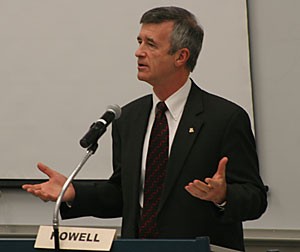The Faculty Senate decided not to change a procedure for investigating faculty misconduct yesterday, citing doubts about anonymity and confidentiality in the disciplinary process.
A baseless accusation against a faculty member could result in a long and difficult investigation, several faculty members said.
“”An anonymous complaint can always be floated out, but it should not be able to initiate a procedure,”” said Marlys Witte, a professor of surgery.
Martin Weinand, a professor of surgery, asked that anonymous complaints against faculty not be allowed.
Anne Murdaugh, a physics graduate student, said she thinks a policy to protect anonymity is important, especially for those who report on a superior.
“”I can envision a situation where a graduate student wants to report his or her adviser for misconduct,”” Murdaugh said. “”But they feel
An anonymous letter can be poisonous
without substance.
– President Robert Shelton
like they are in a very vulnerable position because they could quite simply be fired, no longer be funded, lose their visa and then have to leave the country.””
While the policy does protect those people who decide to make anonymous reports, it does ask them to identify themselves, said Charles Sterling, a professor of veterinary science and microbiology.
A copy of the policy and procedures, distributed to members of the Faculty Senate, states, “”The University discourages individuals from making anonymous allegations about misconduct.””
Provost George Davis said he thought the issue of anonymity is more complicated, adding that anonymous letters should not be treated the same as complaints from someone in person who doesn’t want to be identified.
“”An anonymous letter can be poisonous without substance,”” said President Robert Shelton.
For someone who feels strongly enough about an instance of misconduct to identify themselves to the UA Research Integrity Office, it is more reasonable to grant their request to remain unidentified to others, Shelton said.
Dr. James Ranger-Moore, director of the biostatistics and epidemiology program, said it might be helpful to look at scientific research models, making a distinction between keeping participants anonymous and keeping them confidential.
The Faculty Senate withheld their vote on the misconduct policy until the issue is further clarified in the policy statement itself.
The Faculty Senate also approved a graduate certificate in reading instruction for the College of Education.
The senate also approved a name change for the Mel and Enid Zuckerman Arizona College of Public Health, dubbing it the Mel and Enid Zuckerman College of Public Health.
At the end of the meeting, Wanda Howell, a nutritional sciences professor and chair of the faculty, asked that members of the faculty senate provide input about the most pressing issue they see facing the UA.
Information gathered from feedback from the faculty could be used to alter senate meeting structure to include, for example, more discussion and fewer information items, Howell said.









